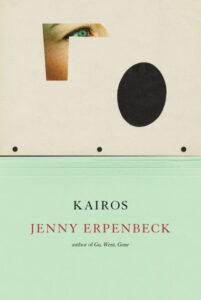
Our treasure trove of terrific reviews this week includes Amal El-Mohtar on R. F. Kuang’s Yellowface, Rob Doyle on Emma Cline’s The Guest, Claire Messud on Brandon Taylor’s The Late Americans, Johanna Thomas-Corr on Claire Kilroy’s Soldier Sailor, and Gal Beckerman on Jenny Erpenbeck’s Kairos.

“An unreliable narrator is an invitation to a shell game. Watch closely, the book says, and if you’re very attentive, you’ll find the ugly truth hidden beneath layers of pleasant obfuscation and textual sleight of hand. But the unreliable narrator of R.F. Kuang’s Yellowface takes a different approach: Instead of hiding the facts, she puts her sordid truth under a glass dome and shines a spotlight over it … It’s a breezy and propulsive read, a satirical literary thriller that’s enjoyable and uncomfortable in equal measure; occasionally, it skirts the edges of a ghost story. It’s also the most granular critique of commercial publishing I’ve encountered in fiction, and seeing the cruel, indifferent vagaries of one’s industry so ably skewered is viciously satisfying … The result is both addictive and slightly sickening, like reading transcripts of someone else’s catty group chat, or watching Succession … If this reads as a quite on-the-nose critique of contemporary conversations about race and appropriation, that’s because it is. This is not a subtle book. It is in fact so obvious that it makes one wonder why Kuang uses the device of an unreliable narrator at all. I kept expecting the whole novel to snap into something more elaborate, more complex … When Yellowface is a satire, I want it to be sharper; when it’s horror, I want it to be more frightening; when it’s a ghost story, I want it to be more haunting; when it suggests a vampiric, parasitic relationship, I want it to be more inviting, more ambiguous, more strange. Instead, all its genre fluidity is in service of the same blunt frankness. Perhaps the ultimate irony of the book is what it has in common with its protagonist: Like June herself, Yellowface seems desperate to not be misunderstood.”
–Amal El-Mohtar on R. F. Kuang’s Yellowface (The New York Times Book Review)
“Published in the run-up to summer, Emma Cline’s second novel is probably what people mean when they talk about a ‘beach read.’ Whereas her 2016 debut, The Girls, arrived on a tsunami of hype and hazy lyricism, The Guest is the more controlled work of a fine talent maturing on its own terms. Sultry and engrossing, with a note of menace, it’s a gorgeously smart affair whose deceptive lightness conceals strange depths and an arresting originality … In its early chapters The Guest looks like it’s shaping up to be another forensic look at the power dynamics between an attractive young woman and a wealthy, older man…One of this novel’s pleasures is how it keeps setting up such expectations only to confound them, so that even halfway through you’re not entirely sure what kind of story this is, save a good one … Without smothering her narrative in subtext, Cline gets at something universal—or at least late-capitalist—about the prostitution of experience and the commodification of sex and personality … You don’t have to read The Guest as a slant treatise on neoliberal precariousness and alienation, or as an even broader one on metaphysical estrangement—but it’s all there should you want it. Or just take it to the beach and savour every page.”
–Rob Doyle on Emma Cline’s The Guest (The Guardian)
“The characters in Brandon Taylor’s The Late Americans have skipped the revolutionary phase in order to pursue graduate degrees in Iowa City. Taylor’s elegant works of fiction…keep a tight focus on their characters, like a magnifying glass … Taylor’s characters are preoccupied with work, sex, and friendship. History trickles through their lives and conversations, but their minds are elsewhere. This sense of the self as an ahistorical individual might broadly distinguish the American consciousness … An ensemble piece, no more or less novelistic than Taylor’s linked story collection, and it revisits similar emotional terrain with compassion and precision … The world about which Taylor writes here may in some ways seem small—many MFA students and alumni will find exquisite provocation in this chapter—but he has a Chekhovian generosity that enables him to convey character with something like tenderness … The relationships move like an eighteenth-century quadrille, at once restrained and spritely. Each of the characters is granted interiority, even when they don’t quite know or understand themselves. People pass in and out of intimacy; several older men, more and less sinister, serve as catalysts, altering the choreography. Taylor’s vision is unsparing, but never bleak.
–Claire Messud on Brandon Taylor’s The Late Americans (Harper’s)

“‘Tell me, men: when were you last split open from the inside?’ asks the narrator of Claire Kilroy’s brilliant, angry, arresting new novel. She wants to know why her husband—slumped in front of Blade Runner, beer in hand—is more moved by the film’s closing speech about man’s mortality than he ever is by his exhausted wife and distressed baby. How is it that he can see something ‘noble’ and ‘epic’ in this very male cinematic moment while failing to recognize her ‘ennobling truth,’ that she risked death to give life to their child? … [Kilroy] has channelled those experiences into a novel that immediately feels like the definitive work on modern motherhood, one that breaks every taboo, whether that’s an instinct to abandon a newborn, kill to protect them, or call them a “f***ing c***” when they misbehave in Ikea … Kilroy depicts motherhood as a surreal, lonely purgatory of cold playgrounds, Calpol-streaked vomit and anthropomorphic household appliances … Motherhood, and what it does to women, is so often treated as a lightweight domestic issue rather than a complex concern that demands serious scrutiny. Kilroy’s book confers on the subject all the imagination, intelligence and profane wit that it deserves.”
–Johanna Thomas-Corr on Claire Kilroy’s Soldier Sailor (The Times)

“If you grew up in East Germany, a country whose national anthem began, ‘Resurrected from the ruins, faces toward the future turned,’ you might find a landscape covered in shards to be almost natural—the broken past coexisting alongside an emerging world of concrete and glass. Those ruins might even inspire an unabashed love, as they have in the German novelist Jenny Erpenbeck, born in that now-extinct country in 1967. ‘Steel girders. Charred beams. Walls with nothing behind them,’ she writes in an essay. ‘Rooms where the rain falls on dead pigeons because there isn’t a roof overhead.’ These are a few of her favorite things … This is a very postwar-German sentiment, and Erpenbeck is a very postwar-German writer. In her professed ‘love of dirt,’ she follows W. G. Sebald and Günter Grass. For these authors, history is not compressed strata; layers of the past surround them, a constant atmosphere, felt and seen anytime they look around. Hans, the middle-aged East German author who is one of the main characters in Erpenbeck’s new novel, Kairos, describes the East Berlin of the 1980s very much in his author’s terms: Inhabiting a place where the past is visible everywhere, exposed and rotting, he concludes that ‘this devastation was the truth … It’s a truth that made Sebald digressively meditative and Grass revel in absurdity. Erpenbeck is symphonic … Her novels exist on epic planes. Erpenbeck repeatedly constructs stories that span generations, letting history leak into and through them. She relies on leitmotifs—themes, objects, exact phrases recur through the narratives over time and space. In America, our fights about history lately come out of a desire to flatten it, to clear the rubble, to find a clean narrative: 1619 or 1776? Erpenbeck ponders her own messy German birthright and sees a landscape of ruins to play in … In Erpenbeck, Germany has a rare national writer whose portrayals of a ruptured country and century are a reminder that novelists can treat history in ways that neither historians nor politicians ever could, cutting through dogma, fracturing time, preserving rubble.”
–Gal Beckerman on Jenny Erpenbeck’s Kairos (The Atlantic)

